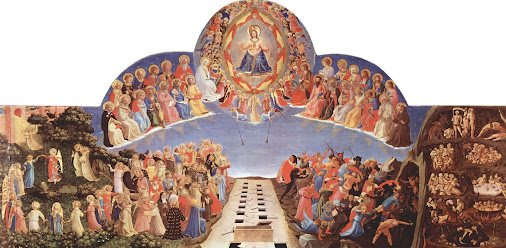He said to them,
“Come after me, and I will make you fishers of men.”
John the Baptist prepared Andrew for the call of Jesus when he told his disciples that Jesus was the lamb of God. Andrew was among those intrigued enough to follow after him. Like most of us he didn't fully understand what those words of John the Baptist about Jesus meant. Lamb of God? That didn't sound like the Messiah for whom they were waiting. Nor does a lamb immediately sound like one we're looking for to help us with our own problems. But even without fully understanding Andrew followed. There was something about Jesus himself that seemed different from other men. And hadn't John said there would be? As to what that something was, Jesus invited him to this deepening understanding little by little. He did not require that he first be perfect and then come after.
And they said to him, “Rabbi” (which means Teacher), “where are you staying?” He said to them, “Come and you will see.” (see John 1:38-39)
We have a lot more information about Jesus than did John the Baptist or Andrew. Their messianic expectation contained only broad lines, and it was not at all clear how those lines overlapped with the arrival on the scene of this "lamb of God". But it is one thing to have information, another thing to have relationship. Our information, vast though it is, seems to motivate us much less than the presence of Jesus motivates those whom he calls.
At once they left their nets and followed him.
Jesus invites us to follow him as well. He tells us, just as Andrew, "Come and you will see." It is only through lived experience as his disciples that the information in our heads about who he is can connect with our hearts in the way it clearly did for those first disciples. Information is important. But how that information intersects with our own brokenness, doubts, needs, and desires is not something that can be worked out all at once. Information can be part of the invitation. But what we need is an encounter that leads us to follow him, even if that means setting aside some of the certainties that a purely abstract conception of the Messiah used to provide.
If you confess with your mouth that Jesus is Lord
and believe in your heart that God raised him from the dead,
you will be saved.
We can know and say that Jesus is Lord. But then again, no one can say that Jesus is Lord except by the Holy Spirit (see First Corinthians 12:3). We can know that God is one, but even the demons know that and tremble (see James 2:19). We are called to a faith that is not content with intellectual content, but reaches out to the object of the content in hope and in love (see Galatians 5:6).
Being Christian is not the result of an ethical choice or a lofty idea, but the encounter with an event, a person, which gives life a new horizon and a decisive direction.- Deus Caritas Est 1 by Pope Benedict XVI
A genuine encounter with Jesus transforms us from bystanders into witnesses. Just as Andrew immediately shared the One he found with his brother Peter we too will want to make him known.
How beautiful are the feet of those who bring the good news!















